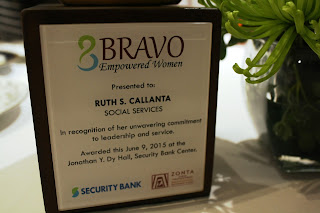The
Center for Community Transformation (CCT) Group of Ministries recently hosted Pagdiriwang,
an international gathering of Christians ministering to the poor. The
event brought together leaders, staff, volunteer workers and friends of
Christian micro-finance organizations to celebrate God and His kingdom agenda of
extending heaven to earth, through inspiring messages, eye-opening exposure
visits, best practices sharing, worship and wonderful fellowship.
Pagdiriwang is
the Filipino word for celebration. The conference is the fourth in a series of quadrennial worldwide gatherings organized by PEER Servants, a non-profit organization based in the US and a ministry partner of CCT.
The
conference coincided with the 4th Transformative Economic Empowerment
(TEE), an annual training conference jointly organized by CCT and the
Ka-Partner Network composed of PEER Servants, Hope International,
endPoverty.org, Five Talents and CCT. It brings in micro-finance
practitioners from around the world to identify and discuss sound practices in
micro-finance.
The
organizations represented and their countries of origin or operation were:
- Action Contre La Misère (ACLAM), Haiti
- Assist Community Initiatives (ACI), Uganda
- Christian Action for Empowering Church and Community (CAFECC), Uganda
- Christian Empowerment Micro-finance (CEMFIN), Zambia
- Coptic Evangelical Organization for Social Services, Egypt
- Christian Service Society (CSS), India
- endPoverty.org, South Africa, USA;
- Hope International, Congo, China, Rwanda, USA
- Integrity Foundation, India
- Invest Credit, Moldova
- Iris Philippines Ministries, Philippines
- Kallarisunchis, Peru
- Peer Servants, Burundi, Haiti, Uganda, USA
- Potter’s House, Guatemala
- Urwego Opportunity Bank, Rwanda
- The Wesleyan Church-Global Partners, Philippines
- Women's Initiative for Health Education and Economic Development, Cameroon
- Y Gro HEED, Sri Lanka
Other
participants were friends or individuals working with these organizations from Mexico, Norway, Singapore, South Korea, and South Sudan.
The main
speakers were David and Kathi Cohen, founders of Moringa Associates based in
Australia; Reverend Calisto Odede, senior pastor of Nairobi Baptist Church,
Kenya; and David Lim, a co-founder of CCT and currently president of China
Ministries International-Philippines,
Plenary
speakers were Ruth Callanta, president and founder of CCT, Ron Chua, professor
at the Asian Institute of Management, and Peter Lees, founder of Sharpening
Stone Enterprises, an Australian organization.
For their exposure trips the participants visited street dwellers, micro entrepreneurs and children ministered to by CCT.
For their exposure trips the participants visited street dwellers, micro entrepreneurs and children ministered to by CCT.
PEER
Servants is a volunteer-based organization that partners with indigenous,
autonomous micro-finance institutions in Africa, Asia, Eastern Europe, Latin
America, and the Caribbean to empower the materially poor through micro-enterprise
development. Its first three worldwide conferences were Kopano,
held in South Africa in 2004, Ricchari, held in Peru in 2007, and Reciprocity,
held in the US in 2011.
Pagdiriwang was held at the CCT Tagaytay Retreat and Training Center from November 8 – 14,
2015.
 |
| Dr. David Lim speaks on Experiencing God's Kingdom based on Isaiah 58:1 - 14. |
 |
| David and Kathi Cohen leading a morning devotion during the eight-day conference. |


























